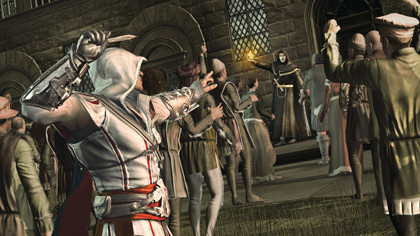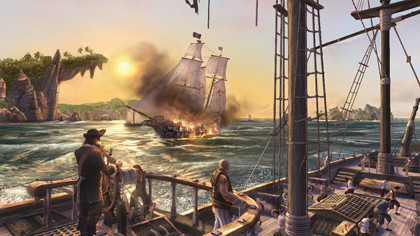The truth about PC game piracy
The figures, the excuses and justifications examined
DRM Nasty
Colin Dwan, project manager at MMORPG, Fallen Earth, said. "While piracy has definitely been a pain in the rear end for the game industry, I believe it's actually made us evolve and be more creative in certain ways. Instead of just lashing out with overbearing DRM, more modern games are starting to embrace features that the internet provides to actually encourage legitimate buyers."
Well, if using the internet to prevent piracy means going down the Ubisoft route then perhaps this is not the solution you've been looking for. This system demands that you remain connected to the internet while playing the game so that the servers can check you're playing an authorised version. If you lose your internet connection, you lose your game.
While Ubisoft have listed several advantages to this new system, the disadvantages are pretty clear, and it really doesn't take into account countries like South Africa where the internet is patchy at best. In fact it is more likely to spur on piracy in those developing countries that have poor internet and high piracy rates.
This is especially poignant in light of the fact that Ubisoft's DRM servers went down on March 2007, crippling the legitimate customers while the pirates happily carried on playing. Nice way to incentivise your customers there.
DRM solutions like this are used as one of the leading excuses by people abandoning the good ship legitimacy for the high seas of piracy. "Media companies mistakenly believe that piracy can be stopped by DRM," says Ernesto, founding father of TorrentFreak, "but it is one of the main sources of piracy. DRM is easily circumvented and in reality it only hurts the people who bought the product. There are many cases where people wanted to buy the product but, because of the tight restrictions, they chose to pirate instead so they can use the product freely."

ASSASSINS CREED: Assassin's Creed 2 was thought to be the victim of massive piracy
Sign up for breaking news, reviews, opinion, top tech deals, and more.
Statistics for games like World of Goo, Crysis and Assassin's Creed beg to differ, however. These games have none of the DRM attachments and restrictions that pirates cry about when copying that master disc for their mates. World of Goo is the critically acclaimed title by indie developer 2D Boy. It's available for digital download, sells for a pittance and is DRM free.
This game should, according to the wailing of pirates, be completely safe from piracy. Instead co-creator Ron Carmel was quoted as saying that the game was being pirated at the rate of about 90 per cent (based on the unique IP addresses to every sale of the game). Many pirates are driven merely by the desire to crack the latest system:
"There's the excitement and challenge of taking on the big guy and wrecking his day, and it's a bit of a middle finger to the people that want to make your life more difficult," says Fallen Earth's Colin Dwan. "I don't think many legitimate buyers fall into this category as much as wanting to just have an easier time playing their game."
Nihal de Silva has an astute counter-argument: "We don't think that the limitations of DRM drive an existing PC software customer to playing pirated games. To successfully download and install a cracked game is a skill in itself as the customer needs to use a number of different programs to access the content, crack and install it on their system."
He agrees that DRM is an issue and said that, "We recently ran a user survey on D2D UK and the majority of users polled (70 per cent) would be more likely to purchase a DRM-free title over one that had DRM wrapping. That said, we haven't seen any sales patterns to indicate that our customers are specifically not buying games because of their DRM."
While this may be a fair point, PC games are suffering under the yolk of DRM. Recent titles like Grand Theft Auto IV, demand that you install Games for Windows, Adobe Flash, SecuROM and the Rockstar Games Social Club application, plus you have to activate it over the internet, all before you can even think of playing.
When you consider that such titles have been released on the console months earlier and that you only need slip the disc into your console to play, there is little doubt as to why PC games are being affected by a lot more than just the pirates.
Rocky ground
The loss of revenue is not only affected by pirates cracking DRM and making the games available for download or copying. Many have built-in protection systems, like Batman: Arkham Asylum or Portal, that result in a glitch or game fail when played illegally. Naturally the pirates that experience these issues publicly slate the game, other gamers assume its poor quality so they don't buy a copy and the game is dead before it's even had a chance, before it is even released in some cases.
THQ's Michael Fitch puts it succinctly, "So, before the game even comes out, we've got people bad mouthing it because their pirated copies crash, even though a legitimate copy won't. How many people decided to pick up the pirated version because it had this reputation and they didn't want to risk buying something that didn't work?" Chicken and the egg.
Not only that, but pirates have the audacity to contact the game's support centres to get help for bugs and issues that are clearly the result of playing pirated games. The developers of Portal: Prelude had this to say about the subject on their site in 2008: "Seriously guys, stop sending us emails because you can't install the game, because you can't launch the game or because you have weird errors everywhere. We're not going to help you make the mod work on pirated versions of Portal or without Steam."
It's hard to feel sympathy for pirates claiming that games are too expensive. If you can afford a PC that runs the latest games then surely you can afford the games themselves? "I think quite a few people use piracy to sample a game and buy it if they like it," claims TorrentFreak's Ernesto, "There are also people who download it illegally because they have a limited budget. However", he reasons "these people would still not have bought the game if there was no piracy."

YOU SAY POTATO: ELSPA hates the flippancy of the term 'piracy' and calls it 'IP Crime', instead
Oh, right, so that makes it okay then does it. But what about other those common pirate excuses such as poor quality games? "There are a few examples of large franchises that put their titles on auto-pilot and I can understand player frustration with these companies," says Colin Dwan, "But that is the extreme, not the norm when it comes to video games. The vast majority of game developers are working around the clock to put together quality entertainment. You can argue that you don't like the end product, but don't try to claim that they aren't pouring their heart and soul into the game you just got for a few bucks."
John Hillier is almost rabid on this issue, having served time at the Trading Standards Authority. "Anybody who makes a copy of something only cares about making money. No matter what you charge they will always be cheaper because they are not paying taxes, not contributing anything to society."
Making games is not easy. The market is competitive and not all developers are backed by the big guns. "Yes, you're going to get some big games making fortunes but there are a lot of games that don't make a fortune," explains Hillier, "If people don't buy them then they lose out and their investment is gone."
What next?
"I think we need to accept that pirates aren't going to be scared away by extensive DRM," admits Colin Dwan, "Once we embrace that the marketplace has changed, we can design our games to be more effective."
New models are being introduced – for instance the micro-transactions that may well pave the way for a new pirate-free future. Still, there are no clear-cut solutions to the issue. If people stop using pirated copies then the phenomenon will likely come to a natural end but, for this to start happening, the industry has to be more transparent.
Gamers, in the main, are not stupid, so vague comments about terrorism or billions of pounds worth of losses are only going to deepen their scepticism. The situation demands honesty. Honesty about the figures quoted to the media and more information about digital distribution and what the regional splits are.
If the industry is more forthcoming about how these figures are reached and what problems they face, as well as how the money is invested into new PC franchises and development, then the public is more likely to stop doubting and start listening. If piracy is rampant in countries like China or Zimbabwe compared with the US and the UK, then introduce systems specific to those countries and stop expecting gamers in the latter countries to suffer extreme anti-piracy solutions.
Ultimately, the core truth about piracy is that there is no apparent truth. The industry is reluctant to speak up, offer hard facts and deliver solid evidence of wrong doings, and pirates spit out increasingly specious arguments in favour of their illegal activities. What is clear is that piracy is a negative force in the industry and that transparency may well be a step in the right direction.